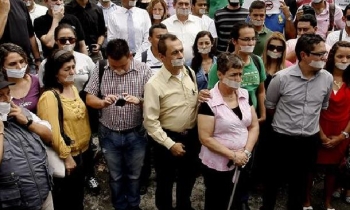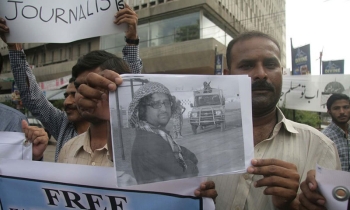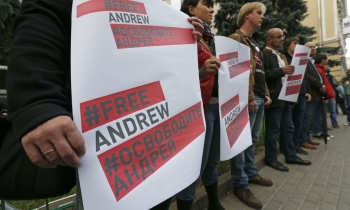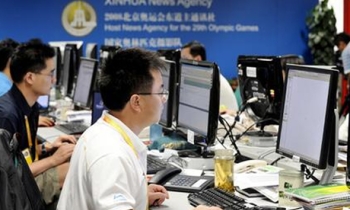The military government in Thailand closed down three community radio stations - Confidante, Taxi Driver Community Radio and Saturday Voice Against Dictatorship - just hours after they broadcast Thursday an interview with deposed prime minister Thaksin Shinawatra. The authorities have also charged them with violating “national security.”

“The closure of the three radio stations and the warning to some 3,000 other local stations are utterly reprehensible,” Reporters sans Frontières (RSF) said. “The government does not do itself any favours with this kind of authoritarian intervention, which violates free speech. The three stations must be allowed to resume broadcasting at once.”
This was the first time that Thaksin gave interview to Thai radio stations since his ouster in a coup on September 19, 2006. He spoke to Confidante from London, where he is living in exile. In the interview, which was also broadcast by Saturday Voice Against Dictatorship and Taxi Driver Community Radio, Thaksin urged his voters to hold on, and said it would not be in the country’s interest for the presidential election to be postponed.
Shortly after the interview was broadcast, RSF reported, Confidante received a visit by a delegation from the military government, which confiscated the recording of the interview and closed the station down. Legal proceedings were initiated Friday against Confidante and Taxi Driver Community Radio while the server of Saturday Voice Against Dictatorship, which is only available on the Internet, was blocked.
Since 2000, thousands of new community radio stations have mushroomed across Thailand's countryside and in its provincial towns. They often filled important news gaps left by the nationally oriented broadcast media, including local coverage of natural disasters, public health, and agriculture — especially in remote areas, where local newspapers are not circulated and Thai language literacy rates are low among ethnic minority groups.
According to a just-published report by the Committee to Protect Journalists (CPJ) titled 'Thailand at a Crossroads', the country's broadcast media, from which an estimated 80 per cent of the population receives its news, has been particularly hard hit by last year's military intervention.
Radio Wihok was one of more than 1,000 community and local radio stations that had recently begun operations across the country's northern regions. All received strict new marching orders from the ruling Council for National Security (CNS) immediately following the coup. In order to stay on the air, stations had to stop reporting news that mentioned Thaksin and halt all call-in programmes. They also had to broadcast military-prepared news three times a day, as well as the national anthem twice a day.
Military censors, acording to the CPJ report, have since moved to block television news footage of the former prime minister, including stock images and interviews aired globally by international broadcasters such as CNN and BBC.
More recently, the junta nationalised Thailand's only privately run television station, iTV, after it said the station owed the staggering sum of 100 billion baht (US$3.1 billion) in unpaid broadcasting license fees and fines. The station was established specifically to guard against a repeat of the military-led news blackout in 1992 that kept millions of Thais in the dark when soldiers opened fire and killed hundreds of pro-democracy demonstrators on the streets of Bangkok.
With critical television news already dampened, the junta's blanket curbs on thousands of local and community radio stations reflect the next major threat to press freedom in Thailand, the CPJ report said. Many media reform advocates fear the military will choose to focus on cases such as Chiang Mai's FM 92.5 as it drafts new media laws, tentatively scheduled for a national referendum in October.
"Thailand is heading toward a landmark moment," Jiraporn Witayasakpan, a professor of mass communications at Chiang Mai University told CPJ. "The 1997 constitution was the first in Thai history to give the people the right to national broadcast frequencies. But with all the fears of conflict and agitation, we fear the military government has a very different set of reform goals."









